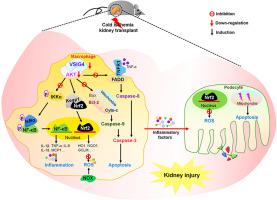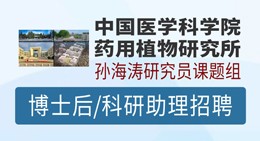Free Radical Biology and Medicine ( IF 7.1 ) Pub Date : 2021-11-29 , DOI: 10.1016/j.freeradbiomed.2021.11.035
Jie Zhang 1 , Kun-Yuan Li 1 , Xiao-You Liu 1 , Yan-Yang Tu 2

|
Prolonged cold ischemia (CI) is a risk factor for acute kidney injury (AKI) after kidney transplantation (KT). AKI is an abrupt and rapid reduction in renal function due to multi-factors, including inflammation, oxidative stress and apoptosis. V-set immunoglobulin-domain-containing 4 (VSIG4) is a B7 family-related protein and specifically expressed in resting tissue-resident macrophages to mediate various cellular events. In the study, we attempted to explore the effects of VSIG4 on CI/KT-induced AKI in a mouse model. Our results showed that VSIG4 expression was markedly down-regulated in serum of kidney transplant recipients with acute rejection, and in renal tissues of cold ischemia-reperfusion (IR)-operated mice with AKI, which was confirmed in murine macrophages stimulated by oxygen glucose deprivation/reoxygenation (OGD/R). We then found that exogenous VSIG4 markedly ameliorated histological changes in kidney of CI/KT mice by suppressing inflammation and apoptosis through restraining nuclear factor-κB (NF-κB) and Caspase-3 activation, respectively. Oxidative stress and reactive oxygen species (ROS) accumulation in renal tissues were also mitigated by exogenous VSIG4 in CI/KT mice through improving nuclear factor-erythroid 2 related factor 2 (Nrf2) nuclear expression. The inhibitory effects of VSIG4 on inflammation, ROS generation and cell death were confirmed in OGD/R-treated macrophages, which further ameliorated oxidative damage and apoptosis in podocytes. More in vivo and in vitro studies showed that CI/KT- and OGD/R-induced AKI was further accelerated by VSIG4 knockdown. Mechanistically, VSIG4 directly interacted with AKT, and AKT activation was necessary for VSIG4 to govern all these above mentioned cellular processes. Collectively, our findings demonstrated that VSIG4 could mitigate AKI in a CI/KT mouse model, and we identified VSIG4/AKT axis as a promising therapeutic target for the treatment of the disease.
中文翻译:

VSIG4 上调通过调节 AKT 信号传导抑制炎症和 ROS,从而减轻肾移植相关的急性肾损伤
长期冷缺血(CI)是肾移植(KT)后急性肾损伤(AKI)的危险因素。 AKI 是多种因素导致的肾功能突然快速下降,包括炎症、氧化应激和细胞凋亡。 V-set 免疫球蛋白结构域 4 (VSIG4) 是一种 B7 家族相关蛋白,在静息组织驻留巨噬细胞中特异性表达,以介导各种细胞事件。在这项研究中,我们试图在小鼠模型中探讨 VSIG4 对 CI/KT 诱导的 AKI 的影响。我们的结果表明,在患有急性排斥反应的肾移植受者的血清中以及在患有 AKI 的冷缺血再灌注 (IR) 手术小鼠的肾组织中,VSIG4 表达显着下调,这在氧糖剥夺刺激的小鼠巨噬细胞中得到了证实/复氧(OGD/R)。然后我们发现外源性 VSIG4 分别通过抑制核因子-κB (NF-κB) 和 Caspase-3 的激活来抑制炎症和细胞凋亡,从而显着改善 CI/KT 小鼠肾脏的组织学变化。 CI/KT 小鼠中外源性 VSIG4 还可以通过改善核因子-红细胞 2 相关因子 2 (Nrf2) 核表达来减轻肾组织中的氧化应激和活性氧 (ROS) 积累。 VSIG4 对炎症、ROS 生成和细胞死亡的抑制作用在 OGD/R 处理的巨噬细胞中得到证实,这进一步改善了足细胞的氧化损伤和细胞凋亡。更多体内和体外研究表明,VSIG4 敲低进一步加速了 CI/KT 和 OGD/R 诱导的 AKI。从机制上讲,VSIG4 直接与 AKT 相互作用,AKT 激活对于 VSIG4 控制所有上述细胞过程是必需的。 总的来说,我们的研究结果表明 VSIG4 可以减轻 CI/KT 小鼠模型中的 AKI,并且我们确定 VSIG4/AKT 轴作为治疗该疾病的有希望的治疗靶点。

































 京公网安备 11010802027423号
京公网安备 11010802027423号